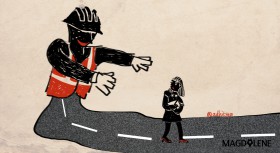August last year I decided to further my participation in democracy, after bumping into a giant banner next to my gated community entrance.
The banner was an invitation to take part in the West Jakarta City Council (Dewan Kota) election. Since Jakarta was awarded a special region, each city under the Jakarta provincial government doesn’t have a legislative council (DPRD). Instead, in 2001 Sutiyoso and DPRD issued a bylaw to establish city councils in the five districts of Jakarta to assist and monitor the district administrations’ performance.
For 10 years, there were little information or publications regarding the City Council’s role. And then, in 2011 Fauzi Bowo decided to revitalize the role of the City Council by revising Bylaw No. 6/2011. After Governor Joko Widodo took office in 2012, the dissemination of the election process was improved and suddenly there were banners hung at strategic places inside my community.
The deadline to submit the application was tight, 10 days, and by the time I read the banner, it was already Day 5 and a Saturday. So I called the number on the banner to ask for more information about it. Nobody answered. After calling the third number on the banner, someone picked up the phone. He asked me to come to the Kelurahan (village chief) office to get all the materials.
On Monday, three days before deadline, I came by to collect the application forms. The first question they asked me was: “What is your husband’s name?”
Confused, I asked back, “Why do you ask?”
“Your husband is the one who wants to apply, right?” Ah!
With 200 percent confidence I told them: “No, I’m the one who wants to apply.”
I smirked as they took in my answer in disbelief. I could understand their reaction – it’s not common to see a woman of the ethnic Chinese minority taking part in a political activity.
At last, they gave me a folder and explained about the requirements. I needed to collect at least 25 signatures (and copies of state ID cards) from my neighborhood; take a medical and psychological test and drug test; submit validated academic transcripts and diplomas; secure a letter of good conduct from the local authorities; produce any commendations or awards I’d received, and various letters from the neighborhood and residential unit heads as well as the village chief. All these I had to submit within three days.
I almost gave up, but then I thought, if I gave up, I lost to a government that was, as usual, too inept to disseminate information in a decent time to allow people to apply for the positions. I called my husband and asked whether I could use his name to contact our neighbors. I called many friends to ask whether they had relatives living in my neighborhood.
Fortunately, my husband is a church activist and he knows many people in our neighborhood, including the neighborhood chief. My friends referred me to their brothers, aunts and uncle, among others.
By 3 p.m. on that humid Monday, I was out canvassing my neighborhood, knocking on many doors, introducing myself (and my husband’s name), explaining the role of the City Council and the City Council Election, and why I wanted to run for the council. I needed at least 30 minutes for every house I visited. The good thing was some houses had three or four adults, so I could get their signatures at the same time. By 9 p.m., I had collected about 20 signatures and copies of ID cards.
In the meantime I needed to take a recent photograph, but first, I visited the local public clinic near my house for a health test. They referred me to bigger health clinic, but apparently the bigger one only performed health tests during the daytime only.
The next day I was prepared to hit several destinations: the subdistrict public health clinic, the West Jakarta City Police Office, my university and notary office. I started early and got my health test done easily.
The doctor asked me: “Are you going to apply for the legislative election?”
It turned out that a few people had asked for a similar test but to run for this year’s legislative election.
Unfortunately, the clinic did not perform psychological health test. I needed to go to a mental health hospital in Grogol, West Jakarta, or the provincial government hospital to get a mental health test. I rushed to my university to get my validated transcript and diploma, while wondering what to do with my overseas diplomas. The university clerk asked me to come back the next day.
The next destination was West Jakarta Police to get a letter of good-conduct and a drug-free letter. There, I met a lot of people who offered their services to help legislative candidate wannabes complete their application. Again, many were surprised to find out I was applying for the City Council. I had to wait 30 minutes to get my good-conduct letter issued, so to make good use of my time I visited the police clinic for the drug test. The doctor asked me to pee in a cup and I was worried that they would need several days to produce the results, but she handed the clean bill straight away.
3 p.m Tuesday: I rushed back home, since I still needed to see the notary, to collect more signatures, and to meet the neighborhood unit head. On the way home, I took a detour to the Grogol Mental Hospital for the psychological test. They told me to come back the next day.
Back at home, before going back to canvassing, I stopped by a neighbor who happened to be a notary. His employee was very nice to me and promised that my documents would be legalized at noon the next day. I finished collecting signatures at 9 p.m.
On Deadline Day, I found out that the psychological exam at the mental hospital would take about three hours, plus another hour of grading. I decided to cross my finger and submit my application, hoping the election committee wouldn’t notice the absence of the mental-health test document.
I managed to return all documents two hours before the deadline. They asked me to wait for another three hours for election orientation.
So there we were, five people inside the deputy village chief office: a middle-aged Chinese woman, who was apparently representing her daughter; three middle-aged men of Padang, Betawi and Arab descent, and me. We were all listening to the deputy village chief’s explanation.
He expressed his delights that there were two women candidates running in the election. We drew numbers and I got number 3. The Election Day was to take place two days from then.
Election Day
The Election Day was attended by more than 200 neighborhood and residential leaders. The deputy village chief gave an opening statement, and for the second time he told the crowd that he was pleased and proud of the gender and race compositions of this election. He was also pleased that all of us were college graduates, some with degrees from graduate schools. The female candidates are Catholics and the rest is Muslims. The candidate of Arab descent was apparently the most popular one, since he knew many neighborhood and residential leaders.
Each of us was allowed five to six minutes to give a statement on our vision and mission. It is always interesting to listen to other people’s ideas, and I appreciated how diverse the five candidates were.
After giving birth back in 2011, my vision and mission has always been related to how I can help shape a better future and environment for my daughter. I tried to keep everything simple, and said that I wanted my child to be able to play on the street and parks, without being afraid that she would be harmed.
After the speeches, it was time to cast votes. According to the election committee, the level of participation exceeded 80 percent, which was quite high.
We were informed of the result in the afternoon by short text messages. I didn’t get the seat, but at least I got second place.
I was quite happy with the result. And most importantly, I was proud that I was able to tackle all the challenges and broke the stereotype by getting involved in politics, however local it might be.
About Elisa Sutanudjaja
Elisa is currently on sabbatical, being a so-called full time mom (which she finds a bit odd because how can you determine part time or full time for motherhood?). She is writing a book about open government and open data, and taking some free courses from EdX and Coursera.








Comments